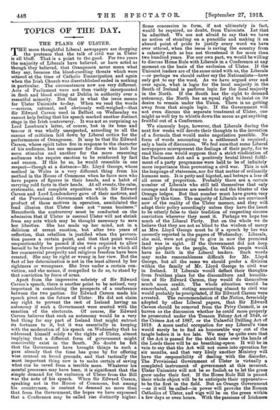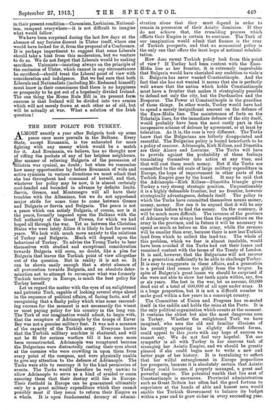TOPICS OF THE DAY.
THE PLANS OF ULSTER. THE more thoughtful Liberal newspapers are dropping the pretence that the talk of civil war in Ulster is all bluff. That is a point to the good. For two years the majority of Liberals have believed, or have acted as though they believed, that Orangemen never mean what they say, because the blood-curdling threats which were uttered at the time of Catholic Emancipation and again when the Irish Church was disestablished ended in nothing in particular. The circumstances now are very different. Acts of Parliament were not then visibly incorporated in flesh and blood sitting at Dublin in authority over a resentful minority. But that is what the issue means for Ulster Unionists to-day. When we read the words —serious, rational, and obviously well-weighed—that Sir Edward Carson used in Belfast on Wednesday we cannot help feeling that his speech marked another distinct stage in the Irish controversy. It was not so surprising as Lord Loreburn's letter, of course, but in its tone and tenour it was wholly unexpected, according to all the canons of criticism laid down by Liberal critics for the performances of Orangemen. It may be that Sir Edward Carson, whose spirit takes fire in response to the character of his audience, has one manner for those who look for mere stimulus and another for the more reasoning audiences who require emotion to be reinforced by fact and reason. If this be so, he would resemble in one respect—though at a distance—Mr. Lloyd George, whose method in Wales is a very different thing from his method in the House of Commons when he faces men who have papers of figures in their hands, and a habit of carrying cold facts in their heads. At all events, the calm, systematic, and complete exposition which Sir Edward Carson and Lord Londonderry gave of their motives, and of the Provisional Government which is the finished product of those motives in operation, annihilated the fond illusion that Ulster does not "mean business." Henceforth the controversy must be conducted on the admission that if Ulster is coerced Ulster will not shrink from any acts which may be thought necessary to save her liberties. She has made up her mind, not in a delirium of errant emotion, but after two years of reflection, that rebellion is justified when the provoca- tion passes a certain point, and that that point would unquestionably be passed if she were required to allow herself to be thrust protesting out of a polity in which all her commercial prosperity and religious freedom have been created. She may be right or wrong in her view. But the fact of her determination is not in the least altered by her rightness or wrongness. She lives under a certain con- viction, and she means, if compelled to do so, to stand by that conviction by force of arms.
Apart from the impressive sobriety of Sir Edward Carson's speech, there is another point to be noticed, very important in considering the prospects of a conference between the two parties. Sir Edward Carson made his speech pivot on the future of Ulster. He did not claim any right to prevent the rest of Ireland having an autonomy if such a Government were erected with the sanction of the electorate. Of course, Sir Edward Carson believes that such an autonomy would be a very bad thing for any part of Ireland that might entrust its fortunes to it, but it was essentially in keeping with the moderation of his speech on Wednesday that he addressed himself solely to the rights of Ulster, almost implying that a different form of government might conceivably exist in the South. No doubt he felt that the Government have brought things to such a pass already that the time has gone by for offering wise counsel on broad grounds, and that tactically the most important thing now is to make certain of saving what can be saved from a terrible mess. Whatever his mental processes may have been, it is significant that the simple demand for the exclusion of Ulster from the Bill was the note of his speech. When Sir Edward Carson, speaking not in the House of Commons, but among his countrymen, is content to demand no more than that from the Government, the hopes we have expressed that a Conference may be called rise distinctly higher. Some concession in form, if not ultimately in fact, would be required, no doubt, from Unionists. Let that be admitted. We are not afraid to say that we have no notion of standing on a punctilio and making it an absurd point of pride to justify every word we have ever uttered, when the issue is saving the country from a calamity such as has not threatened it for more than two hundred years. For our own part, we would be willing to discuss Home Rule with Liberals in a Conference at any moment on the basis of the exclusion of Ulster. If the Unionist leaders are of the same mind with us, the Liberals —or perhaps we should rather say the Nationalists—have only got to say the word. As we have argued over and over again, what is logic for the local majority in the South of Ireland is perforce logic for the local majority in the North. If the South has the right to demand autonomy, the North has an equal right to insist on its desire to remain under the -Union. There is no getting away from that simple logic. If the Government will not even discuss the separate treatment of Ulster, one might as well try to whistle down the moon as get anything fruitful out of a Conference.
We sincerely hope, however, that Liberals during the next few weeks will devote their thoughts to the invention of a formula that would make negotiation possible. No form of words amounting to a settlement is required; only a basis of discussion. We feel sure that some -Liberal newspapers misrepresent the feelings of their party, for to read them one would suppose that a strict vindication of the Parliament Act and a positively brutal literal fulfil- ment of a party programme were held to be of infinitely more importance than preventing a civil war. This is not the language of statesmen, nor for that matter of ordinarily humane men. It is petty and bigoted, and betrays a loss of all sense of proportion. Probably there are a., certain number of Liberals who still tell themselves that only courage and firmness are needed to end the bluster of the Orange lodges. But that number must have grown very small by this time. The majority of Liberals are convinced now of the reality of the Ulster menace, and they will adapt their policy accordingly unless they have the heart to be utterly false to their tradition of respecting sincere conviction wherever they meet it. Perhaps we hope too much of the Liberal Party. But on the whole we do believe that they are not so blind to the wisdom of mercy as Mrs. Lloyd George must be if a speech by her was correctly reported in the papers of Wednesday. Liberals, she said, were not going to give in now the promised land was in sight. If the Government did not keep their pledges to the people, the Welsh people would have no faith in the Liberal leaders. Such words may make reasonableness difficult for Mr. Lloyd George, but all the same we should prefer a division within the family of Mr. Lloyd George to civil war in Ireland. If Liberals would deflect their thoughts from fruitless plans for the discomfiture and humilia- tion of Sir Edward Carson, they would do themselves much more credit. The whole situation would be exacerbated, and rioting amounting almost to civil war would probably be precipitated, if Sir Edward Carson were arrested. The recommendation of the Nation, feverishly adopted by other Liberal papers, that Sir Edward Carson should be removed from the Privy Council, is as barren as the discussion whether he could more properly be prosecuted under the Treason Felony Act of 1848, or the Crimes Act of 1887, or the Unlawful Drilling Act of 1819. A more useful occupation for any Liberal's time would surely be to find an honourable way out of the tangle before it is too late. We may be quite sure that if the Act is passed for the third time over the heads of the Lords there will be no breathing-space. It will be in vain to say that the Act will not come into operation for six months, and that very likely another Ministry will have the responsibility of dealing with the disorder. The Provisional Government of Ulster is virtually a completed instrument of government at this moment. Ulster Unionists will not be so foolish as to let the grass grow under their feet. If the Home Rule Bill is passed their whole object will be to anticipate their opponents— to be the first in the field. But an Orange Government —as it will be called—in power will provoke the Roman Catholics of Ulster, and wigs will be on the green within a few days or even hours. With the passions of Irishmen in their present condition—Carsonism, Larkinism, National- ism, rampant everywhere—it is not difficult to imagine what would. follow.
We have been surprised during the last few days at the absence of any furious dissent in Ulster itself, where one would have looked for it, from the proposal of a Conference. It is perhaps impertinent to suggest that some Liberals should take a hint from this moderation, but we venture to do so. We do not forget that Liberals would be making sacrifices. Unionists—insisting always on the principle of the exclusion of Ulster, which cannot in any circumstances be sacrificed—should treat the Liberal point of view with consideration and indulgence. But we fetal sure that both Liberals and Nationalists (including Mr. Redmond himself) must know in their consciences that there is no happiness or prosperity to be got out of a hopelessly divided Ireland. The one thing the Home Rule Bill in its present form ensures is that Ireland. will be divided into two armies which will not merely frown at each other as of old, but will be actually at war. What a solution of the Irish question !











































 Previous page
Previous page